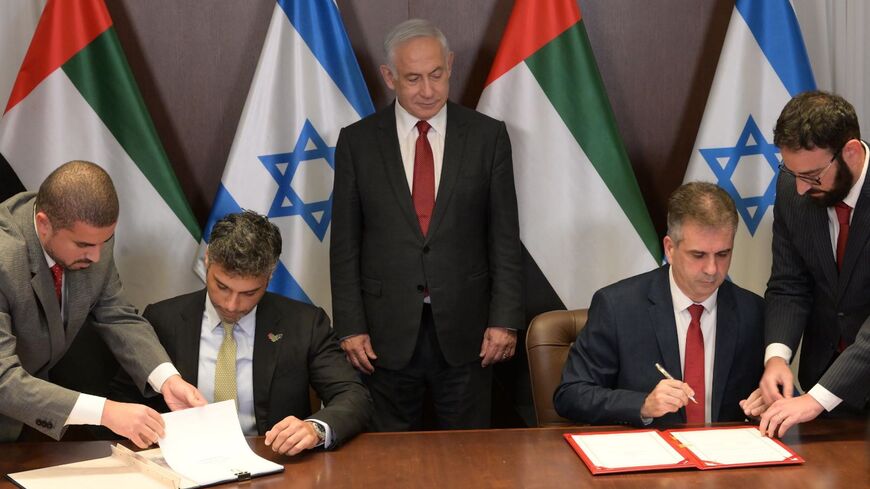Israel and the United Arab Emirates activated a major economic partnership agreement on Sunday, despite recent UAE criticism of the Prime Minister Benjamin Netanyahu government this year on the ongoing escalation and rhetoric towards the Palestinians.
The agreement came ahead of former Israeli Prime Minister Naftali Bennett reportedly visiting in Abu Dhabi on Monday, where he was received by the UAE President Sheikh Mohammed bin Zayed. The visit comes as the UAE continues to snub Netanyahu, who has still yet to visit the country since returning to power.
The UAE’s ambassador in Tel Aviv, Mohamed Al Khaja, signed a customs agreement with Israeli Foreign Minister Eli Cohen. The signing allows the Comprehensive Economic Partnership Agreement that Israel and the UAE signed last May to come into force, the UAE’s Ministry of Foreign Affairs and International Cooperation said in a statement.
Netanyahu was present for Sunday’s signing.
In the presence of Prime Minister @Netanyahu, I signed today w/ Foreign Minister @EliCoh1 on a Customs Cooperation Agreement, putting into force the CEPA (free trade) btw. Israel & the UAE. We expect this to boost trade, improve the standard of living and lower the cost of goods. pic.twitter.com/BYWkE9jIPP
— Mohamed Al Khaja (@AmbAlKhaja) March 26, 2023
The Comprehensive Economic Partnership Agreement removes various customs on goods traded between the UAE and Israel. It is essentially a free trade agreement and aims to boost bilateral trade between the two countries.
On Monday, Bennett met with Zayed, aka MBZ, in his palace in Abu Dhabi. Netanyahu was supposed to visit the UAE himself in January, but the trip was postponed for unknown reasons.
While Israeli PM Netanyahu is unable to arrange a visit to the United Arab Emirates: former Prime Minister Bennett met with the President of the Emirates @MohamedBinZayed at his palace pic.twitter.com/VM6mo9H26V
— Amichai Stein (@AmichaiStein1) March 27, 2023
Why it matters: Israel and the UAE have consistently strengthened bilateral economic cooperation since establishing relations in 2020. Netanyahu, who signed the normalization agreement during his previous government, returned to office last December in a right-wing coalition that includes several Jewish nationalist parties. Since then, the UAE has repeatedly criticized the Israeli government on a host of issues related to the Palestinians.
The following is a breakdown of public UAE criticisms of Israel in 2023.
- The UAE “strongly condemned” Israeli National Security Minister Itamar Ben-Gvir’s visit to the Temple Mount (al-Hamam al-Sharif) holy site in Jerusalem. The visit to the contested site days after Ben-Gvir assumed his position was seen as provocative, in part due to Ben-Gvir’s controversial statements on Palestinians and Arabs in the past.
- The UAE condemned an Israeli military raid in Jenin in the West Bank in February that left 10 Palestinians dead. Both civilians and Palestinian fighters were killed in the operation.
- Earlier this month, the UAE condemned remarks by Israeli Finance Minister Bezalel Smotrich in which he said Palestinian people do not exist.
- On Sunday, the same day the economic partnership was activated, the UAE Ministry of Foreign Affairs issued a statement condemning the Israeli government’s approval of new settlements in the West Bank. The ministry noted its “rejection of all practices that violate resolutions on international legitimacy and threaten to further exacerbate escalation and instability in the region,” according to the statement.
Another moment of tension occurred last week when Israeli Transportation Minister Miri Regev said at a conference that she dislikes Dubai. “I’ve been to Dubai. I won’t be going back. I don’t like the place,” said Regev, according to Israeli media reports.
Her comments prompted Israeli Foreign Minister Eli Cohen to tweet about his affinity for the UAE’s largest city.
I❤️Dubai
— אלי כהן | Eli Cohen (@elicoh1) March 22, 2023
וכך גם מיליון ישראלים שביקרו באיחוד האמירויות הערביות בשנת 2022
🇮🇱🕊️🇦🇪 pic.twitter.com/U0j5oZM3Do
Know more: The UAE has signed Comprehensive Economic Partnership Agreements with three countries: Israel, India and Indonesia. The agreement with India took effect in May of 2022. The Indonesia deal was signed in July of last year but has yet to be activated.
The Emirati Foreign Ministry also announced last year its intent to begin discussions with Kenya on an agreement.








